By Tiffany Gallegos
A lot of people are familiar with the retail side of Goodwill. Did you know those donated items fund Goodwill’s services and programs to help put people to work and build their skills for successful careers? If you’re thinking “no,” don’t worry! I must admit, before I started working at Heart of Texas Goodwill four years ago, I was not aware of the mission side of Goodwill. I also did not know there are 161 independent, local Goodwills across the U.S and Canada that customize mission programs according to the needs of the community. I have a passion for community development, so once I learned how Goodwill operates, I jumped onboard to help carry out the mission of building an inclusive workforce. Part of my role at Heart of Texas Goodwill is to share our services and programs with the community, so I invite you to engage with me in this blog post and beyond (I’m a fan of coffee meetings) to explore what we do and how we can work together as I share an exciting update for our new program, Rise, an accredited online high school.
2019 has been an eventful year so far and it is only March! In January we had our first woman step into the role of CEO/President (shout out to Shannon Wittmer, our former Mission Vice President who does not like shout outs but I’m doing it anyways).
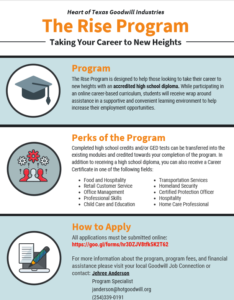
We also implemented Rise to kick off the new year. The purpose of the Rise program is to help individuals advance their careers and achieve financial stability by obtaining an accredited high school diploma.
We found in a community assessment conducted in 2018 that people without high school diplomas earned the least yearly income in our territory and often struggle to advance their job skills and earn higher wages. As a result, we decided Goodwill could offer an alternative path for people to earn a high school diploma. Rise’s career-based curriculum is delivered through Ed2Go, an online learning platform that allows students to work through the program self-paced. This also gives folks, especially those that need to work or meet other obligations, the flexibility to work around their schedules.
Completed high school credits and/or GED testing can be transferred and credited towards completion of the program as well. What I love most about this career online high school is that there are no quizzes or testing. Instead, the course gives students small wins as they build competencies and progress through the program. This is great for people like me who have testing anxiety and/or have faced obstacles in a traditional classroom setting. At the same time, students have access to online counselors through Ed2Go that know the curriculum and are trained to address educational trauma. We also have a wonderful program specialist that will provide weekly check-ins and coaching to help students successfully complete the program.
Our mission for Rise is to foster a culture of lifelong learning by connecting students to postsecondary education training options. In addition to working towards a high school diploma, students can receive a career certificate in the following fields: Food and Hospitality, Retail Customer Service, Office Management, Professional Skills, Child Care and Education, Transportation Services, Homeland Security, Certified Protection Officer, Hospitality, and Home Care Professional.
Our program specialist will work alongside Rise students after they obtain a high school diploma to help them move into higher wage jobs and pursue additional education/training. This could look like enrolling in a technical/trade school, apprenticeship, college/university, or a workforce training program that offers industry-recognized certifications/credentials.
I think overall, providing an alternative path to obtaining a high school diploma is one way our organization can help upskill our workforce and build an additional pipeline of students accessing postsecondary education and training.
I have to say I’m excited we are in the process of enrolling our first cohort and are able to provide financial assistance to six students. If you or someone you know would like to talk more about Rise enrollment, program fees, financial assistance, or perhaps sponsoring a student for Rise, feel free to reach out to me at 254-753-7337.
I also can’t wrap up a blog post without giving a shout out to our four Job Connections in Waco, Temple, Belton, and Killeen. We have awesome staff at each of these centers that can help folks with job searching, resume writing, interview skills training, and beginner/intermediate computer classes at no cost. We are able to provide all of these services thanks to our community donating goods to our retail stores, so next time you clean out your closet or are tidying up your home, consider dropping by your closest Goodwill store to donate!

Tiffany Gallegos is the Development Director at Heart of Texas Goodwill and has called Waco home the past 10 years. She graduated from Baylor University in 2011 and earned her Master of Social Work degree from the Diana Garland School of Social Work in 2015. She is the proud mom of a soon-to-be toddler and enjoys gardening, home projects with her husband, and spending time with friends and family. Feel free to contact Tiffany at [email protected] or 254-753-7337.
The Act Locally Waco blog publishes posts with a connection to these aspirations for Waco. If you are interested in writing for the Act Locally Waco Blog, please email [email protected]for more information.
(Carver Park Baptist Church is helping to lead a healthy food revolution in East Waco through their food related ministries. They have so much going on that we couldn’t squeeze it into one post. This is Part 2 of the story. Click here for Part 1. – ALW)
By Khristian Howard
Carver Park Baptist Church stands as one of the main resources for food in the East Waco community. Their food pantry, open every first and third Friday, serves 120 to 150 people each month. Though doors do not open until 9:30, a line of people from almost every Waco zip code can be seen stretching around the building as early as 8 a.m. Led by Helen Lewis and a team of volunteers from Carver, TSTC, and the community, the food pantry at Carver Park Baptist has proven to be a major resource and lifeline for the residents of East Waco.
In a recent chat with Mrs. Evelyn Moore, one of the leaders of the Carver Park Culinary Arts Ministry, we learned some of the history behind how Carver Park responded to the need for food in the neighborhood and evolved into the fully stocked pantry they run today.
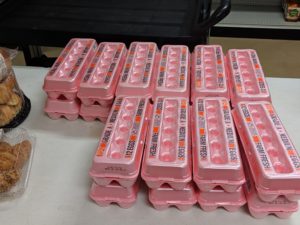
Reflecting on the early days of Carver Park Baptist, Mrs. Moore remembers the events that inspired the opening of their food pantry back in the 80s. “We had a small one [food pantry] that we partnered with TSTC in the 80s. We would carry milk, baby food, and other sustainable things like cereal.” The food pantry effort was a response to the newly adjusted programming at TSTC that allowed women to attend. Mrs. Moore stated, “…young girls that were coming to TSTC were coming with babies and other things trying to improve their lives, and there were many needs not being met because the program was not designed for women.”
In addition to the resources for TSTC students, the church would keep a small selection of shelf stable items for nearby residents who came seeking help. Usually though, they had to purchase foods to help these individuals to fill in the gaps. Moore stated, “We would have food drives and canned good drives and stuff, but it just was not substantial enough to help all of the people who would come in…so a lot of times they received a check or someone took them grocery shopping.”
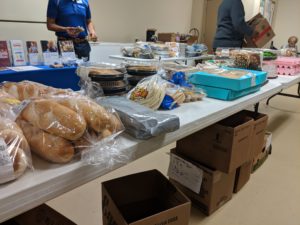
In its beginning, Carver Park’s food pantry was a product of collaboration with a sister church in the area, Lake Shore Baptist Church. In the beginning each church had its own food pantry working to fill food gaps and addressing the needs that affected not only their congregations, but the surrounding communities. Food pantries, however, while a widely popular idea among churches, are generally difficult to keep afloat at a sustainable level. Eventually, the pantry at Lake Shore Baptist closed, and the two churches agreed to have those clients use Carver’s pantry instead.
Eventually, the church gained the capacity to host a full food pantry in partnership with Central Texas Food Bank (CTFB). The CTFB provides a consistent, low-cost source of food. Partnerships like the one that Carver Park has with CTFB are vital to the sustainability of a pantry. The food that organizations like CTFB provide supports nutritional variety and health.
Helen Lewis keeps a nutritious diet in mind when placing orders with CTFB. She makes a careful selection of fruits, vegetables, and meats, and encourages pantry visitors to try new veggies and fruits before picking up sweets and other shelf stable goods. Her goal is to create a balance of both.
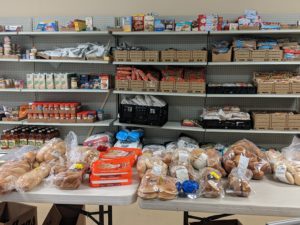
While the partnership with CTFB helps keep the pantry is well stocked, Ms. Lewis depends on relationships and collaboration with the community to supply many items as well. One such relationship is with Caritas, who provides in-kind toiletry donations. In addition, the senior group at Carver Park Baptist contributes by having a baking supply drive every February.
Volunteers from the church and TSTC help out on pantry days. Regular pantry users check-in quickly, and volunteers help new clients complete the short intake process that gauges family size and what benefits they can receive. Once the pantry guests are checked in, volunteers also assist with selecting and carrying food to their cars.
Ms. Lewis and her team have also found a way to reach clients who are unable to physically come to the pantry. The team prepares boxes for clients that are referred to them. These boxes are delivered to each client’s residence or kept at the ready for neighbors and loved ones to pick up.
Carver Park Baptist is just one example of a church stepping up to meet needs in the East Waco community. Other churches in the area have developed systems to address needs for food assistance, childcare, mentorship, and more. A network is growing of people who have made it their goal to take care of their own in a place where outside services do not always cover the needs. The ladies at Carver Park’s food pantry have shown that a mixture of inside and outside support may just be a reliable model for sustaining a healthy food pantry.

Khristian Howard is an Atlanta native and a recent graduate of Georgia State University where she earned a Bachelor’s Degree in Social Work. She has a passion for empowering communities through service, and seeks to connect advocacy to creativity. Currently, she is serving as the AmeriCorps VISTA for Texas Hunger Initiative Waco, where her work focuses on fostering collective impact to improve health and eating habits in East Waco. When she is not working, you may find her sharpening her culinary skills or exploring new poetic and artistic pathways.
The Act Locally Waco blog publishes posts with a connection to these aspirations for Waco. If you are interested in writing for the Act Locally Waco Blog, please email [email protected] for more information.
(Welcome to the Act Locally Waco/Towny blog series. Towny is an app that connects consumers with local businesses for coupons and other great deals. Through this blog series, the folks at Towny will be sharing the stories behind some of our high-quality, local products and helping you get to know some of our energetic local entrepreneurs. For more posts in this blog series, click here: Towny Waco.– ALW)
By Tori Freeman
Many business owners have dreamed of owning their own store for years…not so for Kim Dailey. Though she’s never been especially artistic, she just kind of stumbled into a hidden talent of cake decorating. Turns out she stumbled into something pretty sweet. And suddenly, All Sugar’d Up was born (and we’re SO glad it was!).
What’s the scoop – or should I say slice – on All Sugar’d Up?
“Well short story version: I actually was working a full-time job in a call center and I was looking for something to do because I was bored when I got off work.
I started tinkering around with cake design and started making baby shower cakes for people at my job or their kids’ birthday cakes and then it just kind of blew up from there. I didn’t ever intend on this being what it was, but I found out that I had a knack for it. It kept growing and eventually it got to the point that I couldn’t maintain my current job and go home and bake all night long because I wasn’t sleeping.
So, I left my job at that time in 2012 and opened a store front. My husband literally found a spot that was open and he rented it. He just came in one day and said, ‘By the way, I did this. Get your stuff and go!’”
Had you always been a baker?
“Honestly, not really. My mom made my birthday cakes growing up and she was pretty crafty so she tinkered around with that kind of stuff. And I was around lots of birthday parties – my parents worked at a roller skating rink and they did birthday parties like every weekend, so I was around cake like all the time.
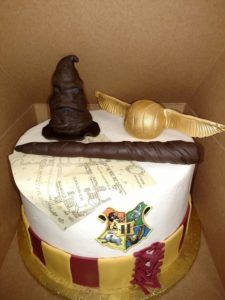
So I was familiar with it in general but I was never really a baker. The most I ever did was make some sugar cookies or chocolate cookies or something like that.
When I decided to start tinkering around, I took a Michael’s class, just one single class that taught us how to make buttercream and icing flowers and things like that. From there I just was like, you know this is pretty cool. I can do this.
After that, I engrossed myself in anything and everything to do with cake decorating. I was online looking at stuff, I stalked people’s Facebook pages, looking at high profile celebrity bakers and watched what they did and blew pictures up and sat down and just started teaching myself. I’d sit there and work and work and work at it until I figured out the technique. So, I’ve pretty much been self-taught.”
What’s your favorite memory involving cake?
“I told you my mom made my birthday cakes as a kid, and when I think back to the very first cake I can ever remember her making, it was a sun. She made the full round cake, and then she made another one and cut it into triangles to put around the outside and iced it up in yellow and covered it in coconut. I think she used maraschino cherries for the eyes and the nose and the mouth.
That’s the first cake that I ever remember from my childhood. And it doesn’t seem like it was anything big, but back then we were in a time where nobody had the big elaborate cakes. Everybody had a sheet cake, you know, they got a little sheet cake at a local grocery store.
But my mom always came up with something different every year, one year it was sunshine, the next year it’d be a rainbow. And so for me that was so special.”
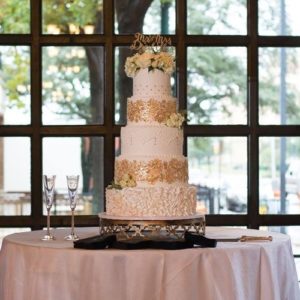
Do you think there’s any misconceptions people have about cake decorating?
“I think the biggest misconception that people have is when they’re comparing a bakery like us to a supermarket or a grocery store. The work that we do here and the kind of cake that you get there are two completely different things.
Most people don’t understand the time that goes into making something. They think it’s just, oh I just call you and you can whip it up in an hour kind of thing.
They don’t understand the art that goes into it and the time that goes into it. It’s not a cake made in a grocery store that was frozen and shipped in and the decorator came in and slapped some icing on and wrote “Happy Birthday.”
This is something that’s custom. What you’re getting from us is a fresh, baked from-scratch cake with homemade icing and someone sitting down and custom creating what you envisioned. And that takes time. You know, just the general wedding cake, you’re talking 15, 20 hours of work between baking, decorating, stacking, all those sorts of things just for a simple wedding cake.”
That’s amazing! And you’ll have multiple orders at once – how do you get it all done?

“I struggled with that for a long time when I was doing everything on my own, and that’s why I wasn’t sleeping. Now, I’ve got two employees: one is my mother who is my primary baker. And then I have another employee that’s been here for almost two years. So we’ve developed ourselves a system now to get everything done.
Even so, when you hit wedding weeks, it is mass chaos and long hours. We’re here an hour or two before opening every single day, and there’s a lot of times we’re here hours after we close at night.
But it’s the life of a bakery, you do what you love and you build yourself a reputation based on the quality of your work. Cakes can be pretty all day long, but if they don’t taste good, nobody wants them. We pride ourselves on providing a product that not only looks spectacular, but it tastes just as good. Our customers come back time and time again.
That’s where our business has built itself so much over the past few years: word of mouth. The majority of our business has been off of referrals. People that have seen our work or have heard their friends talk about us, and they try us out once and they’re hooked. I can’t thank my customers enough for believing in us enough to give us a try, and then for telling everybody about us.”
If you’ve been, you know: All Sugar’d Up is well worth a go! But before you drop by, you’ll want to check out Towny for some special deals. Towny is a free guide that helps you explore Waco businesses and rewards you for choosing local. Find Towny online or download the free phone app!
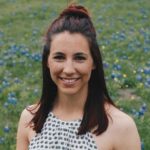
Tori Freeman is a Colorado native turned Texan and a graduate of Baylor University. She works as a part-time paralegal and creative freelancer with expertise spanning writing, editing, and photography. Tori knows firsthand how local businesses can change lives—she met her husband, Braden, while working at the Hippodrome! They now happily live in Waco with their spoiled golden-doodle and their even more spoiled baby boy.
The Act Locally Waco blog publishes posts with a connection to these aspirations for Waco. If you are interested in writing for the Act Locally Waco Blog, please email [email protected] for more information.
By Summer Shine
Most people are affected by alcoholism or addiction in one way or another, whether it’s their own struggle, or a family member or a friend. The disease of addiction and alcoholism has infiltrated our everyday lives. It’s become so prevalent that the CDC proclaimed the opioid crisis in northern states is becoming a national crisis. According to a recent study by the Surgeon General’s office, 1 in 7 Americans suffer from drug or alcohol addiction. Many are touched, but few know what help there is for people who have this disease.
When I decided to get sober in 2013 I, fortunately, had previous experience with recovery and family and friends who were still willing to help. Not all who are afflicted are as lucky as I was. Many find themselves without resources or on long waitlist to get into any sort of treatment facility. Another challenge is that after a short term stay, typically 30-60 days, clients in recovery are expected to figure out a new lifestyle, housing and a recovery plan, with very little assistance. This becomes a major turning point for many people who are seeking long term recovery. What are they to do? Where are they to go? Who is their new support system? These can be stressful and confusing times.
Sober living communities are popping up all over the country as solution to this problem. These homes offer safe, affordable housing in an environment where a recovery lifestyle is commonplace, and mistakes are used as learning tools. Most Sober Living Houses (SLH) require participation in 12-step recovery programs, have straight forward house rules and adhere to probation requirements.
Another study by National Center for Biotechnology Information shows that people in recovery who live in short-term housing for 6-9 months after treatment have a 70% better chance of staying sober for 2 or more years than people who go straight back into old environments.
In 2015 when Sunshine Recovery House opened its doors, there were 5 sober living houses for men in the Waco area and none for women. Historically women are underserved both in addiction recovery and in mental health services. Being a woman in recovery and having many close female friends who are both in recovery and have mental illness, I found the lack of resources disturbing and appalling.
Not being one to take the sidelines when there is a problem to be solved, I addressed the issue and opened a sober living house here in Waco for women! We currently rent 2 small houses close to the old Hillcrest. We have nine beds and are usually full with a waitlist. We recently formed as a nonprofit organization and are raising money to purchase one large house close to downtown that will house 12-14 women and host a live-in house manager.
Waco has been an amazing advocate for Sunshine Recovery House! We’ve seen people come out of the woodworks (figuratively and literally) to show us support and help us expedite the process. It’s been both heartwarming and awe inspiring to see the amount of love people have shown us. More importantly we have been privy to seeing the lives of women in this community radically changed. We’ve seen miracles happen and that is the real game-changer. Women get their kids back, pay off debt, find wonderful careers, go to school, finish probation or clear CPS cases. THESE ladies are the reason we fight through the hard times, and trust me, there are hard times.
I am lucky. I’m lucky to have women in my life who are fighting the same fight I am, who show up to support me and who make the simple, yet hard decision to allow God to change them completely. I’ve learned along the way that I can only keep what I’ve been given, freedom from active addiction, by giving it away.
If you, or someone you love is suffering from addiction or alcoholism, know that there is help. There are 2 treatment facilities in the Central Texas area and a whole host of them in DFW and Austin. More sober living houses are being opened and often I am seeing young people get sober before they have had to suffer some of the same consequences that many have. It’s hopeful and magical and God induced. Some may say it’s a lofty goal to want to eradicate addiction and alcoholism all together, but why not try?
Rollin’ 4 Recovery

Join us March 23rd for a night of laughter, music, food, fun and friends. Comedian Shayne Smith is unapologetically goofy and recants his experiences through hilarious rants about life as a real gangsta….er, geek! Hear some sick beats laid down by Waco’s own Ryan Thomas as he takes us on a lyrical journey through interpretive spoken word, also known as rap. Enjoy a delicious meal provided by Waco’s #1 food truck Club Sandwich and signature mocktail beverages provided by Luna Juice Bar. Not to mention the savage live auction items up for grabs. Trust us, you won’t want to miss this night! If you’d like to mail a check for sponsorship or tables please mail to: Sunshine Recovery House 1516 Austin Ave Suite 3 Waco, TX 76701 Rollin’ 4 Recovery
- March 23 – 7 PM
- Brazos Event Center, 520 Elm Ave.
- General admission $50 – $70. VIP and Table Sponsor opportunities available. Click here for Tickets: Rollin 4 Recovery.
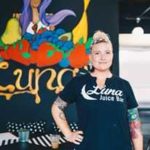
Summer Shine is Owner / Operator / General Juice Slinger at Luna Juice Bar and a Hip Hop Dancer at God’s Great Kingdom.
The Act Locally Waco blog publishes posts with a connection to these aspirations for Waco. If you are interested in writing for the Act Locally Waco Blog, please email [email protected] for more information.
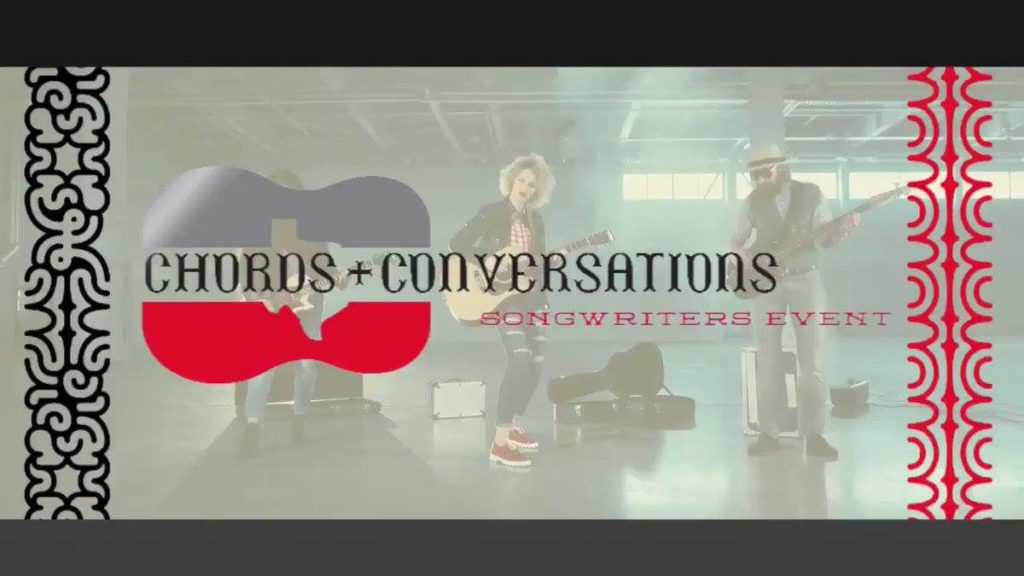
WACO, TX – The second-annual “Chords & Conversations” Songwriters event is set to return on March 30 at the Waco Hilton and will feature three Nashville songwriters who will perform acoustic versions of their hit songs in support of Texas Tech University Higher Education Teaching Site at Waco, directly benefiting Waco-campus students through scholarships.
According to Dr. Lewis Snell, director at TTU Waco, this event is a rare opportunity for music goers to connect with three of the most acclaimed hitmakers in the music industry in an intimate, live performance and discover the stories behind the songs.
“Not only will each artist perform acoustic versions of some of their most well-loved compositions, but they will also relate stories about the people, places and circumstances that inspired those songs,” Snell explained. “More importantly. The event will give you an opportunity to support—in a powerful way—local college students who are pursuing their dreams.”
Set to perform are Nashville Songwriter Hall of Fame member Bob Dipiero, three-time
Grammy Nominee Lee Thomas Miller, and “Song of the Year” Nominee Wendell Mobley, who have penned more than 30-combined chart toppers, including Blue Clear Sky, Take Me As I Am, The Impossible, Fast Cars and Freedom and How Country Feels.
The event will start at 6:30 p.m. and include a pre-show reception catered by Hilton Waco’s executive chef Nathaniel Gay, the performance, and then conclude with an after-show reception where visitors are invited to mingle with the artists over coffee and dessert.
Sponsorship opportunities are still available for this event. For more information, please contact Lewis Snell at 254-299-8288 or email at [email protected]. Individual tickets for the event are now available for $150 each and can be purchased at https://www.depts.ttu.edu/waco/chords-and-conversations/ or visit the Facebook page @TexasTechWaco.
By Matthew Hoffman, MA, BCC
We began, about three years ago, the “Good Friends Volunteer Spiritual Care Program” out of a conviction that within our city, there is a “community of healers,” who if given proper training, in some very basic spiritual care and visitation ministry, under the help and guidance of our professionally trained Staff Chaplains, could come into the hospital context and make a difference in the lives of people in need.
Since we began this volunteer program, with now, visits numbering into the thousands, having taken place, this hypothesis has born itself out to be true, that there are everyday people, who can stand as “healers,” in sacred places, like that of a patient’s room, and by doing so, can make a profound, health giving difference in the trajectory of people’s lives.
Here in Waco, we are seeking to take the “Good Friends” program and pilot a new version of this to help mobilize volunteers from local bilingual/Spanish speaking congregations to the help advance the care of our Spanish only speaking patients. Coming into a hospital can be a very anxiety producing experience. How much more so if you speak a different language than the majority of your healthcare team? By being a member of the Good Friends program as a bilingual volunteer you will be a welcomed presence offering prayer as desired, a listening ear and making people aware of the other spiritual care resources that would be available to them.
- Through the Good Friend Program you will be trained in areas of:
- How to minister to the spiritual and emotional needs of the sick.
- Discover the unique nature of hospital ministry.
- How to care for people of diverse religious traditions and cultures.
- Being a ministry of presence
- The ministry of active listening
If you would like to be part of the Good Friends program as a bilingual volunteer, or if you just want to grow in your ability to care for sick within your own faith community (for pastors, who would like to send members to this training for added help in their congregation, please do so!), join us on Monday, March 25 from 1-430pm at the Allison Auditorium at Baylor Scott and White Health-Hillcrest Hospital. You can RSVP to Chaplain Matthew Hoffman @ [email protected]
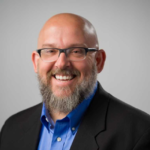
Chaplain Matthew Hoffman is a Board Certified Chaplain who serves at the system level as a Manager of Baylor Scott and White Health’s Faith In Action Initiatives (CTX). He oversees the development of various spiritual care programs in many of BSWH’s hospitals within its Central Division, as well as its local and international humanitarian aid and medical missions programs.
The Act Locally Waco blog publishes posts with a connection to these aspirations for Waco. If you are interested in writing for the Act Locally Waco Blog, please email [email protected] for more information.
Waco, TEXAS (March 11, 2019) Deep in the Heart Film Festival collaborates with industry professionals and government officials to bring innovative film education to Waco. On Saturday, March 30th the Deep in the Heart Film Festival presents three educational sessions that dive into the art and business of filmmaking in Central Texas. Festival VIP pass holders receive access to these sessions in addition to all films and parties. Individual tickets for the sessions are also available for the first time through the Deep in the Heart website: www.deepintheheartff.com
Super 8 filmmaking workshop
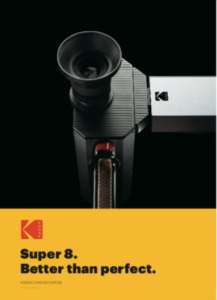
This Super 8 filmmaking workshop, presented by Kodak, covers a brief history of Super 8, and focuses on using Super 8 film today – discussing (and showing) films and music videos, highlighting what film stocks are available, and diving into how to find and choose the best camera for your projects. In addition, attendees get a sneak preview of the new, yet-to-be-released, Kodak Super 8 camera with digital display. Deep in the Heart is one of the first festivals to profile the camera. Plus, attendees get hands-on experience filming with super 8 cameras and film.
About Kodak Presenter, Norwood Cheek:
Norwood Cheek’s passion for filmmaking began when he was 15, making in-camera edited Super 8 short films. He combined his love for film with music and began shooting and directing music videos – primarily on Super 8 and 16mm. He has directed more than 80 music videos for such artists as She & Him, the EELS, SuperChunk, AFI, Ben Folds Five, French Kicks and Squirrel Nut Zippers. He directed and ran the Flicker Film Festival in Chapel Hill and Los Angeles from 1994-2010 and wrote the Flicker Guide to the World of Super 8 filmmaking. He has led Super 8 filmmaking workshops at festivals, art centers, museums and universities around the world.
Session is March 30th at 1:30 pm. Tickets available at www.deepintheheartff.com
Panel Discussion
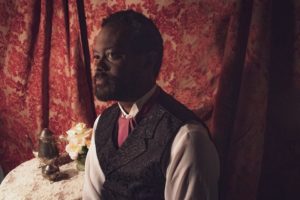
Sam Henderson, Baylor University Lecturer of Theater and Film, facilitates a panel discussion including Texas talent agents and working actors from both Austin and Dallas. This is an open and informative discussion on how to land roles for both TV and film in Texas. With shows like “Queen of the South” and “Fear of the Walking Dead” currently filming in Texas, this panel will be of great interest to Waco area talent looking to appear on screen.
Session is March 30th at 3:30 pm. Tickets available at www.deepintheheartff.com
Film locations Tour
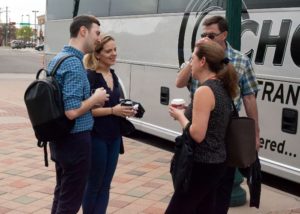
The Film Locations Tour is a guided tour of Waco film sites for film scouts and filmmakers, conducted by the Waco Film Commission and Convention & Visitors Bureau. The is a driving tour of Waco aboard a motorcoach with possible stops at the Historic Village, Brazos Park East, and other locations. Attendees will have all their questions answered regarding filming Waco, find out about the benefits of production in Central Texas, and network with attending filmmakers.
The session is March 30th at 10:00 am. This is a free event, but tickets are required. Please reserve your seat through www.deepintheheartff.com.
For further inquiry, please contact Festival Co-Director, Samuel Thomas at [email protected] or 817-800-0643
By Gabrielle Chaney
The idea of creating a natural hair club at Baylor University started in my 2001 Honda in Spring 2017. My friend, and now former president of ROOTS NHC, Victoria Ellison and I were casually discussing how it would be a great idea to create an organization on campus dedicated to promoting, celebrating, and educating people about black natural hair on campus. Three weeks later I start receiving text messages and emails about becoming an officer on campus. I was shook! We started something that I would never have thought would be possible at a predominantly white institution.
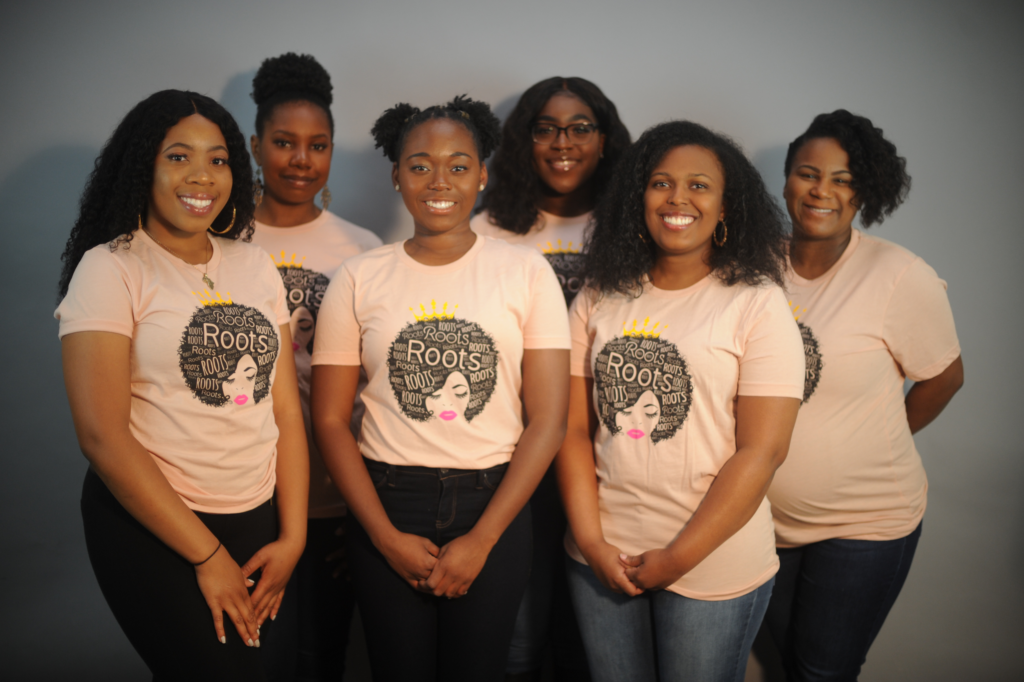
The start-up of ROOTS NHC was not easy. In the beginning, many students did not understand our purpose and were skeptical about having a new organization on campus, administration did not understand our vision.
To gain traction we knew we needed to find something different to attract people to attend our meetings. One huge initiative, which we still continue to do, was providing natural hair products and samples to students who join our organization or students in need. “Why not provide something useful and cost efficient for students to try in their hair?” we thought. In the black community, natural hair products are not cheap. Quality brands of natural hair shampoo and conditioners for black hair can cost over $20, so our goal is to try and provide opportunities for students to win prizes, hair products & samples that natural hair companies provide us, at every meeting. We have been blessed to receive donations and support from huge companies, such as Aunt Jackie’s Natural Hair Products, As I Am, Curls, Cantu, Palmers, Do Gro and many more.
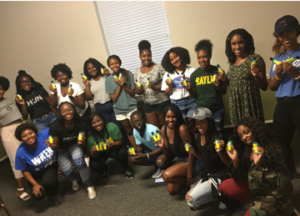
The concept of our meetings is that hair is the starting point for larger discussions. We have discussed issues such as colorism in society, natural hair in the newsroom and journalism, natural hair in the business world, hair education, and even hot topics such as culture appropriation and the historical roots of African hair. The conversations dive deeper into loving the skin God has blessed us with, appreciating the hair on our heads, and educating non-blacks on the importance of black culture.
As a result of these conversations we had the idea of creating a hair event. We hosted the ESSENCE Hair Show & Expo at Baylor in the spring of 2018. We worked to bring vendors and to have hairstylists showcasing their work. At the event we provided giveaway products, free haircuts, and performances.
This year we will be hosting the 2nd Annual SPRING FEST Hair Show & Expo at Baylor University. Our goals in planning this event are to invite the entire Baylor and Waco community to witness something new and unique in Central Texas. The event has gained traction from start-up businesses, entrepreneurs, and local businesses. We will have vendors from Waco, Dallas, Houston, and Austin that specialize in natural hair products, hair accessories, skin care, and so much more. We will be hosting even more performances, vendors, bigger prizes, free food and haircuts than last year. All of the ticket sales will be donated to the Family Abuse Center of Waco, Texas.

I am blessed to have this opportunity and grateful for how far our organization has come in the past two years at Baylor. As I close my senior year, I only pray our work as servants of God will continue through this organization.
ROOTS Natural Hair Club is more than just a hair club. We want every attendee at our meetings and events to leave feeling loved and appreciated. I pray, as a president and advocate for black culture, that I have helped cultivate leadership in my officers and freedom of expression in all our members and attendees. We have great ideas and I know that, if we have the drive, ROOTS NHC can reach even further in accomplishing our dreams.
If you are interested in attending the SPRING FEST Hair Show & Expo it is on March 30th, 2019, from 2-6pm at Baylor University’s Bill Daniel Student Center. Tickets are $2 presale and $5 at the door. You can purchase tickets through www.Eventbrite.com, type in “SPRING FEST Hair Show & Expo.” All ticket sales will be donated to the Family Abuse Center.
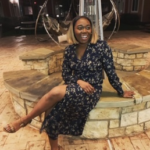
Gabrielle Chaney is a senior Athletic Training major at Baylor University. She is from Missouri City, Texas, and originally from Lafayette, Louisiana. Her career goals are to work as an Athletic Trainer and Physical Therapist for a University. Eventually, she would like to have her own business. She loves getting to know people, watching sports, music, cooking, and also discussions on social justice and activism. One of her big passions is ROOTS Hair Club at Baylor University. “This organization allows me to have a voice on campus and express the love of hair and community!” she says. One of her other passions is leadership and working on becoming a better leader. “I believe Baylor University has cultivated an atmosphere where my leadership abilities have had room to grow and shine,” she says. “I am grateful for my time at Baylor and ready to see what the world has in store for me in the future.”
By Brandi R. Ray, Ed.D
The Heart of a Teacher Educator
When I was 9 years old President Ronald Reagan announced that the first citizen to go into space would be a teacher. This teacher would be a part of the Challenger Mission that was set to launch in January of 1984. The teacher that was eventually chosen for the mission was Christa McAuliffe, a social studies teacher from New Hampshire. She spent a year away from her classroom preparing for the Challenger Mission and training for space travel. I followed the news intently that year, watching TV clips about her preparation. Nine-year-old me believed a teacher, a professional lifelong learner and scholar, could do anything…even travel to and teach in space.
Fast forward ten years to January 1994. The 18-year old me was a senior at Coahoma High School, set to graduate third in my class of about 75 students. Although I was a good student, I was unsure of what I wanted to be or what major I should choose for college. I was meeting with my high school counselor. “A teacher,” I mentioned that day, “I think I could be a great teacher.” The counselor looked up at me with a concerned gaze. “Brandi, how about becoming lawyer? Major in Communication then go to law school. You can do so much more than just teach.” She encouraged me to “set my sights high,” teaching could be my “fallback.”
As I pursued my career journey, that counselor became one of many who referred to teaching as my “fallback.” Boy were they wrong!
Teaching, and now teacher education, are my purpose. Teaching is my calling, my vocation, my chance to be a difference maker, a change agent. As a teacher I have had the opportunity to continually learn and be creative, to profoundly impact the lives of children, to contribute to my community, and to work in an environment that is never dull. For me, teaching was and is a rebellion. Teaching is a way to impact others and transform myself on a daily basis. I can be a lifelong scholar and student, seeking new knowledge my entire life. I can work and always be relevant. Teaching is my chance to change the future. As the author Henry B. Adams once said, “A teacher affects eternity: he can never tell where his influence stops.” Teaching is power.
The Call to Teach
Each day, over 350,000 teachers in the state of Texas enter their classrooms and work tirelessly to educate our children. In a recent opinion column for the Dallas Morning News two of my personal educational icons, Wesley Null and Diane Ravich, discussed educational reform in Texas. They noted that: The heart of any school is the teacher. The only way to ensure that every Texas child receives a quality education is to place a well-educated, well-prepared teacher in every classroom. That truth will never change.
The demand for qualified teachers is growing desperate. According to Texas Education Agency (TEA) estimates, Texas will require a 26% increase in teachers to keep up with our rapidly growing population. According to Jessica Attas, Vice-President of Public Policy for the Greater Waco Chamber of Commerce, there are some tremendous challenges in teacher recruitment and retention in our own community. Citing a recent InvestED TX report, Attas notes that the higher education teacher pipeline is down 22% since 2010, while the K-12 student enrollment growth has increased 10%.
The Call to Act
This data translates into a very clear local directive. Simply stated: If we expect to have the excellent, well-prepared teachers required to meet our needs in the greater Waco community, we need to start growing our own.
We need some of our best and brightest Waco area students to become teachers. We need an excellent, affordable, local option for those students to get the higher education they need to become high-quality teachers. We need the best teaching professionals in our local school districts to mentor these teacher candidates. Then we need these brand new, well-trained teachers to go to work for our local school districts and stay here in the Waco area to build a bright future for our community.
TechTeach
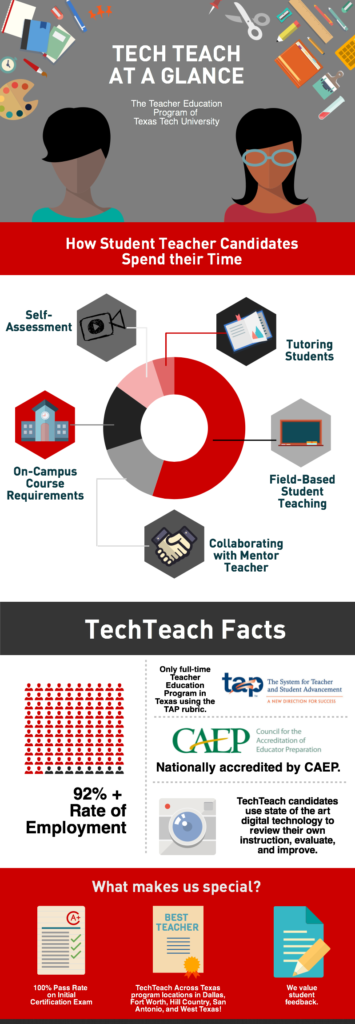
In September of 2018, I was hired by Texas Tech University Waco and Texas Tech University College of Education to begin the work of establishing a quality, affordable teacher education program in Waco.
That program, “TechTeach,” is a clinically intensive, competency-based degree program designed to prepare teachers who will improve the academic achievement of K-12 students. New teacher candidates will start working in classrooms in their first semester of college. They will use state of the art digital technology to capture their instruction. Then they will use this video footage to evaluate and improve their teaching effectiveness.
TechTeach candidates will work in partner districts alongside an experienced, handpicked mentor teacher. This co-teaching will involve working together to plan, carry out, evaluate and adjust instruction in whole-group and small-group settings.
Our program is an important one. It is rigorous and it provides an affordable educational opportunity for would-be teachers in our community. We expect our graduates to enter the classroom confident in their ability to teach and with very little debt. This can have a profound effect on teacher retention.
High quality teaching in our local classrooms is a critical need. Institutions of higher education have a responsibility to recruit and train a strong, diverse pool of teacher candidates who can meet that need. I believe our program at Tech Waco will do just that. I am a teacher. Teaching has never been my “fallback” profession. I am proud to say that teaching and teacher education have been my lifelong rebellion. Just as Christa McAuliffe said during an interview before the Challenger Mission, “I touch the future: I teach.”

Dr. Brandi R. Ray is the Site Coordinator / Instructor for the College of Education at Texas Tech University Waco. Receiving her doctorate in Curriculum and Instruction, Brandi has worked in teacher education at the university level for over 15 years. She has been married to her husband Lee for 18 and half years and has three children, Aidan who is 16 years old, Lily who is 11 years old, and Leighton who is 6 years old.
The Act Locally Waco blog publishes posts with a connection to these aspirations for Waco. If you are interested in writing for the Act Locally Waco Blog, please email [email protected] for more information.
Notes:
- “Remarks at a Ceremony Honoring the 1983–1984 Winners in the Secondary School Recognition Program”. The American Presidency Project. August 27, 1984.
- Texas Education Agency, Texas Educators Certification: https://tea.texas.gov/Texas_Educators/Certification/
- Projections Central, Long Term Occupational Projections: http://www.projectionscentral.com/Projections/LongTerm
- Texas Workforce Commission: https://twc.texas.gov/
- US Bureau of Labor Statistics, May 2015 Occupational Employment and Wage Estimates, Texas: https://www.bls.gov/oes/current/oes_tx.htm
- The heart of a school is its teachers, and teachers should be at the heart of school finance reform By Wesley Null and Diane Ravitch https://www.dallasnews.com/opinion/commentary/2019/02/10/heart-school-teachers-teachers-heart-school-finance-reform
- Teachers aren’t losers. They’re lifesavers. By Kristin Karnitz. https://www.pbs.org/newshour/education/opinion-teachers-arent-losers-theyre-lifesavers
By Craig Nash
When asked what her favorite part of the job is, Lakaisha Clark, the cafeteria manager at Parkdale Elementary School in Waco, gestures toward a room full of kids eating breakfast and replies, “This.”
“I don’t know what other people say about the kids here, but when I look out across this room, what I see are a lot of leaders,” she said. She loves speaking to kids individually and giving them encouragement to see in themselves what she sees in them.
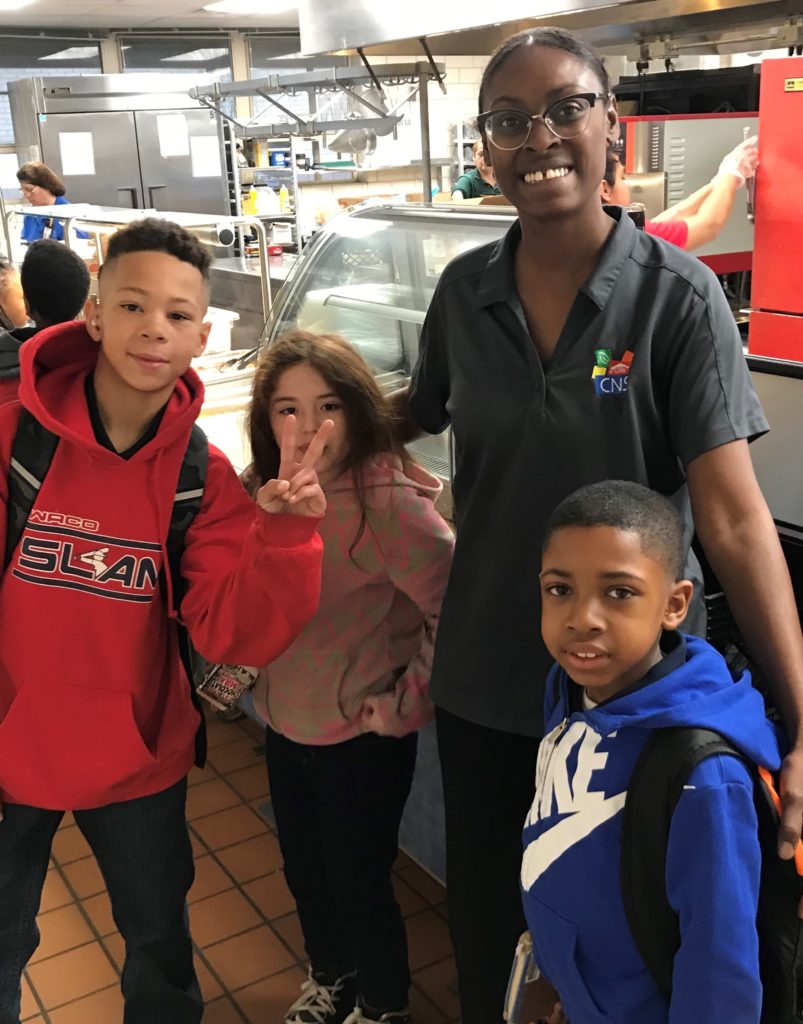
That ability to see the potential in others is likely one of the reasons she is in her current position. When this school year began, she was hired as a cafeteria worker at Parkdale. The management with WISD Child Nutrition Services quickly saw her leadership abilities and promoted her to Cafeteria Manager. The school has seen a drastic increase in both attendance and breakfast participation this year, which has had Clark overseeing a lot of changes in her cafeteria service. New workers have been added and physical changes to the building were made to accommodate an extra line for students to enter in.
She is at the school by 6:00 am and by the time she leaves around 3:00, has served Parkdale students over 450 breakfasts, 600 lunches, as well as afternoon snacks. All of this while managing a team of workers, placing and receiving orders, and tending to regulations associated with operating a USDA program. According to Assistant Principal Wendy Moulds, Ms. Clark does all of this with a smile on her face and an infectious, upbeat personality that lifts the spirits of students, faculty and staff.
At the Texas Hunger Initiative, we are convinced that addressing poverty and food insecurity requires a multi-pronged approach that includes policy makers, business, community leaders and non-profit organizations. But the foot soldiers on the front lines of ending childhood hunger are the Child Nutrition departments at our public schools. Food Service directors of these departments, like Cliff Reece at Waco ISD and Dave Thiel at La Vega ISD, oversee massive, complicated programs that have one goal in mind: To feed children. They are often the unsung heroes in our community, working behind the scenes to provide nutrition assistance to tens of thousands of kids in the Heart of Texas Region.
Usually food insecurity in families means that meals are spread thin, or difficult decisions have to be made about purchasing choices. But occasionally it means that school breakfast will be the first meal a child has eaten since they left school the previous day. Cafeteria Managers and food service workers like Lakaisha Clark recognize this, which gives them a sense of mission and intentionality about the work they do.
The first full week of March every year is National School Breakfast week, which is set aside to recognize the importance school breakfasts have in all of our communities. This week in the Heart of Texas, student athletes from Baylor visited campuses in Waco and La Vega ISD’s to celebrate the role Child Nutrition Departments play in the health and wellness of our kids. You should consider joining them in this celebration by taking some time this month to speak a word of encouragement to the Child Nutrition staffs of our local schools. Their work is done with great care and a deep love for the children in our communities.
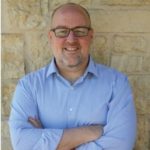
Craig Nash is the Regional Manager for Child Hunger Outreach at Baylor’s Texas Hunger Initiative. He enjoys talking and writing about Waco, Country Music, and Faith. He blogs at 17dutton.com.
The Act Locally Waco blog publishes posts with a connection to these aspirations for Waco. If you are interested in writing for the Act Locally Waco Blog, please email [email protected] for more information.
